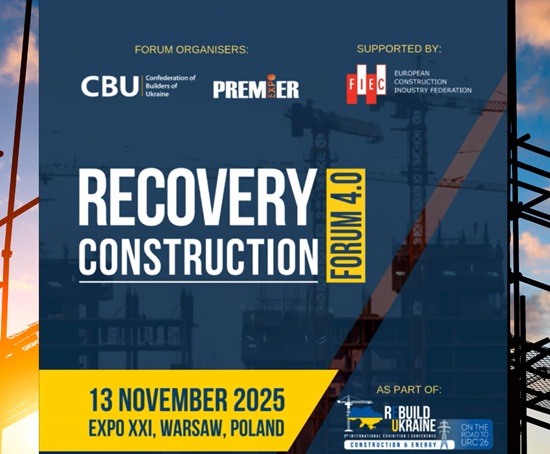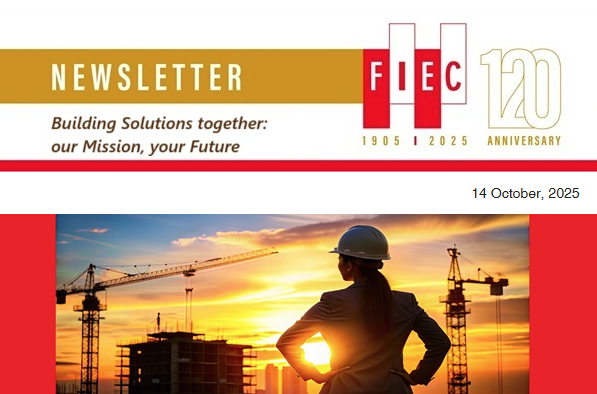
In memoriam Christophe Maes, President of Embuild
It is with great sadness that we have learned of the passing last weekend of Christophe Maes, President of our Belgian member federation Embuild and Vice-President of FIEC in charge of Social Affairs.
As his close colleagues at the Belgian federation pointed out, “he was a man who was entirely devoted to his work and very respectful of the people he worked with. A committed contractor and inspiring President gifted for bringing people together and motivating others to work together to build forward-looking solutions.”
Having held various management positions within the Belgian federation since 2002, he has also demonstrated his commitment to the construction sector at the European level through his election as FIEC Vice-President in 2024, representing the group of countries comprising Belgium, Luxembourg, and the Netherlands on the Steering Committee.
We will always remember him for his optimism and good humour. He will be missed by all who had the good fortune to know him.
All our thoughts are with his family and all his colleagues at Embuild at this time of great sadness.

European Affordable Housing Plan: Preparation accelerates at EU level
However, several other political groups and in particular the S&D were very virulent against the draft and accused the Rapporteur of not taking into account issues like speculation, financialisation, homelessness, short-term rentals, dereliction, public funding for affordable housing, rent controls and tenants’ rights.
In reaction, on 8 October, the S&D group presented its own plan for “Affordable and decent homes for all”. In this document, the S&D Group sets out 10 objectives: “– to recognise housing as a fundamental human right; – secure €300 billion in European funding for affordable and decent housing, including €100 billion in subsidies; – further regulate short-term rentals; – reform the rules on State aid to facilitate access to housing for people on low and medium incomes; – combat property speculation, in particular by regulating real estate purchases abroad; – strengthen tenants’ rights and ban family evictions; – ensuring sustainable homes for all, including a European renovation loan with clear social criteria; – eradicating homelessness and supporting vulnerable groups; – rethinking the Stability and Growth Pact to enable Member States to invest in housing; – address harmful tax rules”.
In the meantime, Member States are preparing EU Council conclusions, due to be adopted in December. The current draft is divided into 4 sections: financing; construction and sustainability; planning – where the need to accelerate and streamline permitting procedures is well reflected; and social inclusion. Negotiations are still open on several points, namely the revision of the rules governing State aid granted to companies managing services of general economic interest (SGEI) and the recommendations to combat homelessness. A new draft should be presented by the Danish Presidency by 23 October.
The S&D position is available via the below tab.
| Read more |

Public Procurement: FIEC & EIC Communication on the Müller Report
Ahead of the European Parliament’s plenary vote on the own-initiative report by MEP Piotr Müller (ECR-PL) on EU Public Procurement, FIEC and EIC addressed a joint letter to key MEPs to reaffirm the importance of maintaining flexibility for contracting authorities in the division of contracts into lots.
While FIEC and EIC support the goals of rule simplification and facilitating the access of SMEs to public procurement, they are concerned about the possible introduction of overly rigid constraints in future legislation. Currently, Article 46 of Directive 2014/24/EU provides a sufficient flexibility to public buyers to decide whether or not to devide a contract into lots and to justify their decision if they choose not to do so.
In their core message, the federations stated: «The signatory federations therefore strongly believe that, while contracting authorities should continue to properly assess whether it is appropriate to divide contracts into lots, they must preserve the freedom to determine autonomously the number, size and scope of those lots, without being subject to administrative or judicial interference.»
FIEC and EIC will continue their awareness-raising work with the European institutions to ensure a regulatory framework that reconciles SME access with the technical and economic realities of our sector.

Industrial Decarbonisation in the Construction Sector
On 25 November, the European Commission is expected to adopt a legislative proposal of significant relevance to the construction sector. This initiative, titled the Industrial Accelerator Act (formerly known as the Industrial Decarbonisation Accelerator Act or IDAA), aims to establish lead markets for the development of low-carbon industrial products. Labelling schemes for “green” steel and cement are among the instruments of this initiative.
The construction sector absorbs nearly 40% of the total steel produced in Europe, making it by far the largest customer of steel manufacturers. However, it is important to highlight that contractors predominantly source steel from the secondary route (e.g. rebar, wire rod), which offers clear advantages in terms of carbon emissions and circularity.
Early in October, a specific labelling initiative for “green” steel was presented to EU policymakers and other stakeholders. The European Commission, which is currently finalising the legislative proposal, expressed support for this label. FIEC has serious concerns for several reasons. Firstly, the label appears to be not legally compatible with existing legislation, notably the Construction Products Regulation (CPR), as well as Environmental Product Declarations (EPDs) and Declarations of Performance and Conformity (DoPCs).
Furthermore, it was observed that secondary steel manufacturers withdrew and are no longer involved in this specific initiative. The labelling methodology seems to place secondary steel production at a disadvantage. As a result, only limited volumes of certified European rebar will be available to contractors operating on the European market. This represents a serious obstacle to the dynamics of the construction market, particularly if such labels are introduced as mandatory non-price criteria in public procurement (cf. Green Public Procurement).
Moreover, we wish to emphasise that simplified labelling schemes for industrial materials in construction are neither effective nor helpful. Unlike consumer products, construction materials are procured in large volumes by experienced professionals. Procurement teams already rely on detailed technical documentation, standards, and performance specifications, including environmental criteria defined by the CPR. Life-cycle Global Warming Potential (LC GWP) thresholds for new buildings already require contractors to undertake comprehensive life-cycle assessments, incorporating science-based calculations of embodied carbon with clear reduction targets. Any “green” label adds further complexity to this process and undermines the very decarbonisation goal if criteria other than the carbon intensity are used to determine the emission class on the label scale.
FIEC addressed the effectiveness of lead markets and “green” labelling in achieving decarbonisation targets as early as July in the FIEC Position Paper titled “Industrial Decarbonisation: Lead Markets and Labels for Low-Carbon Industrial Products in Construction“.
| Read more |

Sustainability Reporting Simplification:
European Parliament adopted negotiating position
On 13 October, the European Parliament’s Committee on Legal Affairs adopted the latest compromise text of the first Omnibus Law. The text had been informally agreed among lawmakers the previous week. A majority of committee members also voted to enter interinstitutional negotiations based on this report, with the Swedish conservative MEP Jörgen Warborn as the Parliament’s lead negotiator. The Council had already agreed on its negotiating position in June.
The first Omnibus Simplification Package on Sustainability Reporting was proposed by the European Commission in February this year and entered the ordinary legislative co-decision procedure, involving both the Member States and the European Parliament. Following the Parliament’s adoption of its negotiating position, trilogue discussions with the Council can begin, with the aim of reaching an agreement on the file soon.
The package concerns the Corporate Sustainability Reporting Directive (CSRD) and the Corporate Sustainability Due Diligence Directive (CS3D) with the aim of reducing bureaucratic burden for companies while maintaining a high level of ambition regarding sustainability reporting and due diligence, and to ensure the competitiveness of companies in Europe.
| Read more |

Construction Blueprint 2: Partners met in Athens
On 8-9 October, the partners of the Erasmus+ “Construction Blueprint 2” project gathered in Athens for the second General Partners’ Meeting, hosted by FIEC’s Greek member PEDMEDE.
The meeting was an important occasion to review progress made and exchange ideas on how to strengthen the skills ecosystem within the European construction sector.
For two days project the partners discussed updates on the implementation of the Pact for Skills, key performance indicators shaping the construction skills landscape and reflections on advancing strategic approaches to sectoral skills cooperation. The partners also had an opportunity to hear insight from CEDEFOP, which focused on employability and opportunities for women and youth in the construction industry.
| Read more |

Save the Date: Recovery Construction Forum 4.0 – Warsaw, 13 November
FIEC is pleased to announce that the Recovery Construction Forum 4.0 will take place on 13 November 2025 in Warsaw, Poland (Expo XII).
Now in its 4th edition, the Forum is organised by FIEC’s Ukrainian member CBU (Confederation of Builders of Ukraine) and supported by FIEC. Discussions will bring together construction industry leaders, policymakers, and stakeholders from across Europe. The event aims to foster dialogue and share best practices on how the sector can accelerate recovery while embracing the green and digital transitions.
FIEC President, Piero Petrucco, and other FIEC representatives will actively join the Forum.
Registration details, full programme and additional updates coming soon.
| Read more |



